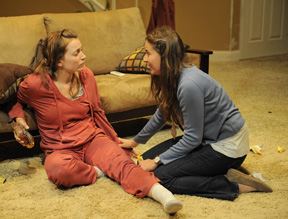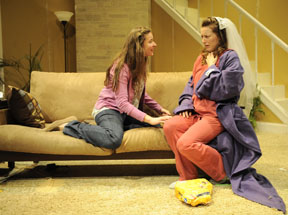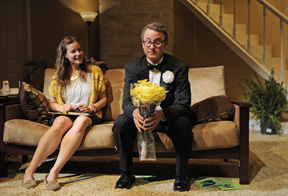MAKE A FELINE FOR THEATER WIT
At the beginning of Tigers Be Still at Theater Wit, 24-year old Sherry takes a microphone and announces to the audience, karaoke style, “This is the story of how I stopped being a total disaster and got my life on track and did not let overwhelming feelings of anxiousness and loneliness and uselessness just, like, totally eat my brain.†Well, maybe. But for most of this 1 hour and 40 minute one act play, Sherry’s feelings of anxiety, loneliness, and uselessness threaten to bring her down. The young woman is engulfed in problems that her determinedly perky and optimistic attitude may never surmount. Life has dealt Sherry a very bad hand.
Sherry lives in a messy house with her older sister Grace, a couch potato wallowing in despair because she was jilted by her louse of a boyfriend, subsisting on Jim Beam and TV reruns of the movie “Top Gun.†Upstairs, their mother has withdrawn permanently into bed, suffering from an auto immune disease; the medication has caused mammoth weight gain, and the former high school prom queen refuses contact with any living person, including her daughters. She communicates to them only by telephone from her bed. Sherry not only has to deal with a dysfunctional sister and mother, she is still traumatized by the departure of her father, who simply walked out on his family.
Sherry’s social life is nil. At 24, she’s never had a boyfriend, and she’s never been employed until now: her new job is that of an art teacher working for a middle school principal named Joseph, who was advised to hire Sherry by her mother, whom he dated during the woman’s prom queen days. The job comes with one millstone. Joseph insists that Sherry take on his 18-year old son Zach as a teaching assistant, and also provide the teen with art therapy sessions in her home. Zach is a sullen CVS employee devastated by the loss of his mother in an auto accident. Joseph is thus faced with raising an uncooperative and belligerent son while he grieves over the loss of his wife.
So those are the characters in Kim Rosenstock’s play: five people leading lives of not so quiet desperation (we never see the mother). The play is directed by Theater Wit Artistic Director Jeremy Wechsler at a leisurely pace, and the viewers sit on either side of Andrei Onegin’s minimal set that consists primarily of a few pieces of furniture and a lot of mess (in cooperation with Emily Bennett’s properties design). Until the speed picks up in the final scenes, patience is required from the audience lest they tire of the short scenes that play back and forth like a tennis match.
However, it’s easy to endure the company of so many troubled and pathetic characters, because Rosenstock writes with sympathy and humor. She creates clearly etched individuals, providing meaty roles for performers who are all able to get under the skins of these downtrodden people. By play’s end, all the characters experience shifts in their lives that just might herald a brave new day, though each still has steep emotional and psychological hills to climb. Who knows whether or not these characters will continue to be liberated from their sorrows and hang-ups and enjoy livable lives?
Mary Winn Heider carries the play as Sherry, whether dealing with her defeated sister and mother on the home front, trying to build a relationship with the difficult Zach, or battling her own demons of vulnerability and insecurity. We root for Heider’s Sherry because the woman is trying so hard with so much relentless enthusiasm against such appalling odds. Heider is an attractive young lady, which works against the premise that Sherry never had a boyfriend. While the actress in the Off Broadway production had a physically gawky presence that added a kooky comic dimension to the character, Heider’s Sherry is still credible and sympathetic in her desperation and that’s critical to the success of this production.
Matt Farabee is terrific as Zach, a downer of a character who can irritate spectators with his self-centered glumness until his back story is revealed near the end of the play. Then he converts from an annoying and self-involved teen-ager into a person struggling with internal burdens no 18-year-old should be forced to carry. The character of Grace is indolent and self-pitying, so Kasey Foster has a thankless role for much of the play, even as Grace stimulates much of the play’s comedy. But Foster meets the role head on, delivering the kind of quirky performance Laurie Metcalf would have provided 25 years ago at the Steppenwolf Theatre (Foster even looks a lot like Metcalf).
As Joseph, the only real adult in the play, Guy Massey is funny and pathetic, which are the two poles that delineate the character. Massey beautifully performs a short scene in which Joseph tries to cancel his wife’s subscription to a yoga magazine, fending off the magazine representative’s relentless questioning about why the subscription should be cancelled. Joseph is in such denial that he won’t simply tell the rep his wife is dead. It’s the play’s saddest scene and all the stronger for its understatement.
 Even within the evening’s laid-back pace, Wechsler deftly commands both its humorous and semi-tragic elements; the comedy never gets too broad nor the serious portions too mawkish. It’s a tough balancing act that the production manages with insight, humor, and even compassion. Mike Durst designed the lighting, Christine Pascual the grungy costumes, and Christopher Kriz the sound, which leans effectively on selections of rock music.
Even within the evening’s laid-back pace, Wechsler deftly commands both its humorous and semi-tragic elements; the comedy never gets too broad nor the serious portions too mawkish. It’s a tough balancing act that the production manages with insight, humor, and even compassion. Mike Durst designed the lighting, Christine Pascual the grungy costumes, and Christopher Kriz the sound, which leans effectively on selections of rock music.
The play’s title refers to a tiger that escaped from the town zoo and roams the community for the several weeks the play covers. It’s difficult to believe that a metaphor, I mean a tiger, could move about the town for so long undetected, but it does. Audiences can parse the meaning of the escaped tiger, but it’s best to watch these wonderful actors present characters who are trying desperately to emerge from their own self-imposed cages.
photos by Liz Lauren
Tigers Be Still
Theater Wit in Chicago
ends on June 3, 2012Â EXTENDED to June 16, 2012
for tickets, call 773.975.8150 or visit Theater Wit
for more shows, visit Theatre in Chicago






{ 1 comment… read it below or add one }
Agree with your take on this rather sweet play.